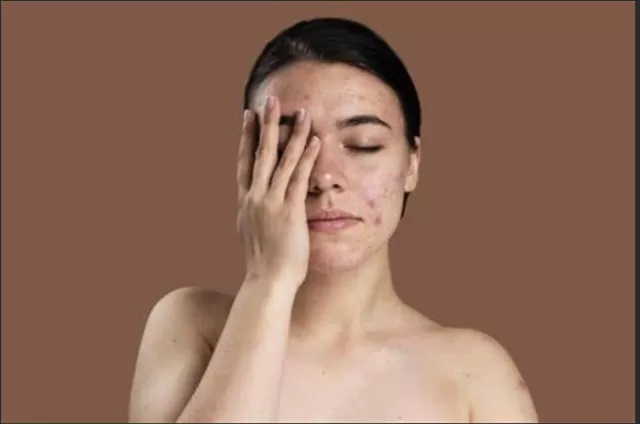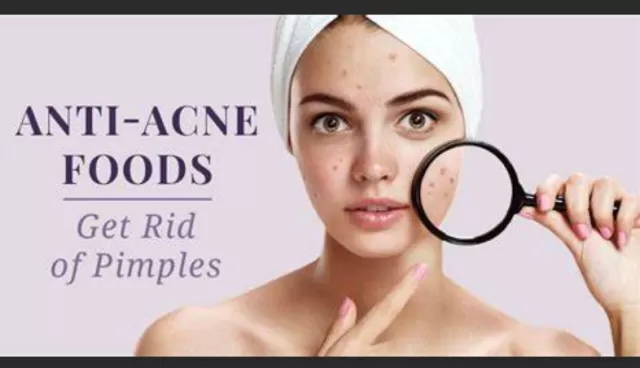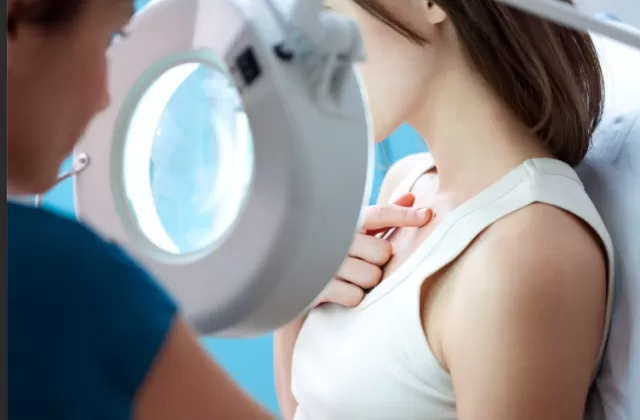Combatting Acne from Dry Skin. The association between dry skin and acne challenges the common perception that breakouts are exclusively linked to oily skin. Dermatologists shed light on this connection, emphasizing the interplay between skin balance and the integrity of the skin barrier.
Dry skin and acne are not mutually exclusive, and the imbalance or compromise of the skin barrier can set off a chain reaction leading to breakouts. The dry months of winter, known for low humidity levels, can exacerbate both dryness and acne, creating a challenging environment for the skin.Addressing this dual challenge requires a nuanced approach, taking into consideration both hydration and acne management. Dermatologists recommend tailored skincare routines, emphasizing gentle cleansing, sun protection, spot treatments for acne, and consistent moisturization to rebalance the skin and promote a healthier complexion.
By understanding the intricate relationship between dry skin and acne, individuals can implement effective strategies to restore skin balance and achieve a clear, hydrated complexion, even in challenging winter conditions.
Exploring the Benefits of Rice Water in Hair Care: Insights from Dr. Gaby Longsworth

Rice water has gained acclaim in the realm of hair care due to its rich content of proteins, vitamins, minerals, amino acids, and antioxidants, according to Dr.
Gaby Longsworth, a Ph. D., scientist, certified hair practitioner, and founder of Absolutely Everything Curly. These essential elements contribute to a spectrum of advantages, fostering stronger and healthier hair.
Dr.Longsworth highlights the key components found in rice water and their specific benefits:.
Proteins: Contribute to the strength and vitality of the hair.
Vitamins C and E: Vitamin C boosts sebum production, moisturizing the scalp, while vitamin E coats the hair, creating a soft and silky texture.
Amino Acids: Building blocks of proteins, amino acids penetrate the hair strand, aiding in strengthening and repairing the hair from within.
Antioxidants: Contribute to overall hair health.
One notable component, inositol, often listed on product labels, is a naturally-occurring carbohydrate in rice.
Dr. Longsworth outlines three key benefits of inositol:.
Increased Elasticity: Enhances the hair’s ability to stretch without breaking.
Decreased Surface Friction: Creates smoother hair surfaces, reducing knots and tangles.
Long-lasting Effects: Remains within the strands even after rinsing.
Dr.Longsworth emphasizes the efficacy of rice water, particularly in addressing concerns such as over-moisturized, limp, or lifeless hair. A weekly rice water rinse is deemed highly effective for those with curls, providing strengthening protein treatment.
However, Dr. Longsworth underscores the importance of patience and consistency, noting that visible benefits may become apparent after four to six weeks of regular use.
This underscores the notion that, like many potent hair care solutions, long-term improvements require dedication to a consistent regimen.
Clarifying the Relationship Between Rice Water and Hair Growth: Insights from Dr. Gaby Longsworth
While rice water may contribute to the appearance of longer, thicker hair, it’s essential to distinguish this visual effect from actual hair growth, according to Dr.
Gaby Longsworth, a Ph. D. , scientist, certified hair practitioner, and founder of Absolutely Everything Curly. Dr. Longsworth provides clarity on how rice water interacts with the hair strands.
She explains that the larger proteins present in rice water are too sizable to enter the hair strand.
Instead, they create a substantial protective coating over each strand. This coating minimizes breakage, providing a visual impression of thicker and longer hair.
However, it’s crucial to note that this treatment does not accelerate the rate of hair growth.
The association between rice water and perceived growth arises from the protective coating that minimizes breakage, allowing the natural growth of the hair to become more evident.
Dr. Longsworth emphasizes that while rice water doesn’t speed up hair growth, it can be beneficial for individuals experiencing scalp issues.
Massaging rice water into the scalp promotes a healthy scalp environment, which, in turn, can encourage hair growth through improved overall scalp health.
Understanding the nuanced relationship between rice water and hair growth helps individuals set realistic expectations while appreciating the potential benefits of this ingredient in fostering healthy and resilient hair.
Pros and Cons of Rice Water as a Hair Treatment: Insights from Dr. Gaby Longsworth

As with any hair treatment, rice water protein treatments come with both advantages and potential drawbacks, particularly depending on the hair’s condition.
Dr. Gaby Longsworth, a Ph.D. , scientist, certified hair practitioner, and founder of Absolutely Everything Curly, provides a nuanced perspective on the pros and cons of using rice water for hair care:.
Pros:.
Strengthening Agent: Rice water can act as a strengthening agent, aiding in the repair of damaged hair.
Repair for Chemically Processed Hair: Individuals with chemically processed, bleached, or colored hair are considered ideal candidates for rice water protein treatments.
Cons:.
Not Suitable for Healthy or Fine Strands: Those with already-healthy or fine hair strands may want to avoid rice water treatments.
Risk of Protein Overload: Adding rice water to already-healthy and protein-rich hair may result in dryness and stiffness, commonly known as protein overload.
Unnecessary for Low Porosity Hair: Protein treatments, including rice water rinses, are generally considered unnecessary for individuals with low porosity hair (healthy hair with a strong cuticle layer) or fine hair strands that are easily overwhelmed.
Understanding the specific needs and characteristics of one’s hair is crucial in determining the suitability of rice water treatments.
While they can offer significant benefits for damaged or chemically processed hair, individuals with already-healthy hair should exercise caution to avoid potential adverse effects such as protein overload. Dr.
Longsworth’s insights provide valuable guidance for individuals seeking to incorporate rice water into their hair care routine.
Incorporating Rice Water into Your Hair Care Routine: Tips from Dr. Gaby Longsworth

To harness the benefits of rice water in your hair care routine, Dr.Gaby Longsworth offers practical insights on the optimal usage and Considerations:.
Start with Clean Hair: Use rice water on freshly washed, towel-dried hair that is free from buildup.
Alternatively, you can apply the rinse on dry strands.
Application and Duration: Apply the rice water treatment to your hair and let it sink in for the recommended duration, typically around 10 minutes or as specified by the product you are using.
Rinsing: Rinse the rice water treatment thoroughly to prevent over-treating your hair.
Follow with Deep Conditioning: Always follow a rice water rinse with a deep conditioning treatment.
Alternatively, you can mix the rice water with your deep conditioner for added nourishment.
Clarifying Products: Incorporate clarifying products into your routine in between rice water treatment sessions.
This helps remove any residual coating, preventing moisture blockage and potential protein overload.
Choose Products Wisely: When selecting products that contain rice water, carefully review ingredient lists.
Dr. Longsworth recommends choosing formulas where rice water is listed within the first five slots.
Examples of products with high rice water content include Briogeo’s Don’t Despair Repair Rice Water Protein + Moisture Strengthening Treatment and Camille Rose’s Honey Nectar Deep Conditioning Masque.
By following these guidelines, individuals can effectively integrate rice water into their hair care routine, maximizing its benefits while avoiding potential pitfalls associated with overuse or inadequate cleansing.
Dr. Longsworth’s recommendations offer a practical approach to incorporating rice water for healthier, stronger hair.
*The information is for reference only.